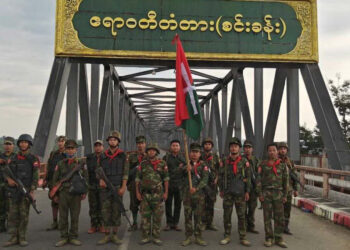TOUNGUP, Arakan State — Beating a path into the heart of domestic religious tensions in recent years, opposition leader Aung San Suu Kyi appealed to the impoverished voters of Burma’s troubled Arakan State on Friday in an impassioned speech promising jobs and more accountable government if her party sweeps a Nov. 8 general election.
Thousands of villagers from across Toungup Township turned out in the eponymously named town for the first of three stops by Suu Kyi in the southern part of the state, where her National League for Democracy’s primary opponent this November is the regionally popular Arakan National Party (ANP).
“When I have visited to Hlaing Thayar industrial zone, I have met so many young female workers, some of them waiting to get a job. … They said there were no jobs at home so they came to Yangon [Rangoon], and that is evidence of how much our country needs to develop,” Suu Kyi told supporters.
“Although the world-famous Ngapali beach [in Arakan State] makes a lot of money for hotel businessmen, local villagers are still very poor. We need to change the system to solve these problems. Vote for us to change it.”
Several rally attendees on Friday asked Suu Kyi if the NLD would favor “Bengalis”—the term used by the government and most Arakanese Buddhists to refer to stateless Rohingya Muslims—over the local ethnic Arakanese community, with many villagers citing rumors that the party was biased in favor of Muslims.
Over the course of a campaign season that began Sept. 8, the NLD has been forced to address similar concerns across much of majority-Buddhist Burma, where a concerted effort to paint the party as such appears to be afoot.
Suu Kyi responded that some candidates in recent weeks had employed unfair and unprofessional tactics to win favor, particularly by using race and religion to sway voters. The NLD chairwoman reminded the audience that doing so is illegal, and urged those present to think critically about individuals that might be attempting to manipulate voters.
For rally attendee Ei Ei Phyo, a 20-year-old resident of Kai Shay village, the Nov. 8 poll will be the first time in her life that she has a chance to vote. She told The Irrawaddy that she had not yet decided which party would garner her support.
“Nobody is [politically] aware here and we don’t know what voter education is,” she said.
Her willingness to hear out Suu Kyi’s pitch stood in contrast to 32-year-old Myo Min Hlaing, a resident of Toungup town who said his support for the ANP this November was unwavering, despite knowing nothing about the candidates being put forward by the state’s dominant Arakanese party.
“I hope for nothing, but I love Rakhine [Arakan]. So I will vote for the ANP,” he said.
In the 23-year-old NLD supporter Than Zaw, there is hope here for Burma’s main opposition party, which between the ANP and the country’s ruling Union Solidarity and Development Party (USDP), faces arguably its least certain electoral prospects in Arakan State.
“I hope they [the NLD] will create a better future for the youth,” he said.
With her decision to tour Arakan State, Suu Kyi is making an assertive but calculated push into western Burma, where her party’s struggle to counter a rising tide of Buddhist nationalism and attendant anti-Muslim sentiment is arguably facing its biggest test.
Two bouts of violence in 2012 pitted the state’s Rohingya Muslims against its Arakanese Buddhist majority. The unrest killed more than 100 people and displaced about 140,000, with most of those affected from the state’s Muslim minority.
Toungup played host to an early flashpoint in the violence, when 10 Muslims were murdered on a bus in the township, an apparent revenge killing for the rape and murder of a Buddhist woman by Muslim men on Arakan State’s Ramree Island.
Since the violence, conditions at camps for the displaced have deteriorated, in particular for the affected Muslims, who are viewed as illegal immigrants from neighboring Bangladesh despite many having lived in Burma for generations. The situation has prompted tens of thousands of Rohingya to flee the state on rickety boats, seeking asylum elsewhere in the region.
Conditions on the ground and the mass exodus of so-called “boatpeople” has prompted international outcry and earned Rohingya the unenviable designation as “one of the world’s most persecuted minorities” in some circles. Caught in the middle, the Nobel Peace Prize laureate Suu Kyi, as politician, has walked a fine line between appearing overly sympathetic to the Rohingya’s plight—and in the process risking losing Buddhist votes—or alternatively being viewed increasingly as indifferent to the struggles of the embattled minority.
Her three-day tour notably avoids the regional capital Sittwe—a city purged of most of its Muslims since 2012—and northern Arakan State, where Burma’s border with Muslim-majority Bangladesh sees a blurring of the population’s ethnic composition between South and Southeast Asian lineages.
Suu Kyi will travel to Thandwe Township on Saturday, before wrapping up her tour of the state in Gwa Township on Sunday.

















